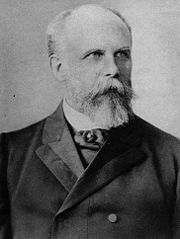
William Thierry Preyer
Encyclopedia

England
England is a country that is part of the United Kingdom. It shares land borders with Scotland to the north and Wales to the west; the Irish Sea is to the north west, the Celtic Sea to the south west, with the North Sea to the east and the English Channel to the south separating it from continental...
-born physiologist who worked in Germany
Germany
Germany , officially the Federal Republic of Germany , is a federal parliamentary republic in Europe. The country consists of 16 states while the capital and largest city is Berlin. Germany covers an area of 357,021 km2 and has a largely temperate seasonal climate...
.
Biography
Preyer was born in RusholmeRusholme
-Etymology:Rusholme, unlike other areas of Manchester which have '-holme' in the place name is not a true '-holme'. Its name came from ryscum, which is the dative plural of Old English rysc "rush": "[at the] rushes"...
at Manchester
Manchester
Manchester is a city and metropolitan borough in Greater Manchester, England. According to the Office for National Statistics, the 2010 mid-year population estimate for Manchester was 498,800. Manchester lies within one of the UK's largest metropolitan areas, the metropolitan county of Greater...
. He studied physiology and chemistry
Chemistry
Chemistry is the science of matter, especially its chemical reactions, but also its composition, structure and properties. Chemistry is concerned with atoms and their interactions with other atoms, and particularly with the properties of chemical bonds....
at Heidelberg
Heidelberg
-Early history:Between 600,000 and 200,000 years ago, "Heidelberg Man" died at nearby Mauer. His jaw bone was discovered in 1907; with scientific dating, his remains were determined to be the earliest evidence of human life in Europe. In the 5th century BC, a Celtic fortress of refuge and place of...
, where he received his doctorate in 1862. In 1866 he earned his medical degree at the University of Bonn
University of Bonn
The University of Bonn is a public research university located in Bonn, Germany. Founded in its present form in 1818, as the linear successor of earlier academic institutions, the University of Bonn is today one of the leading universities in Germany. The University of Bonn offers a large number...
, and in 1869 succeeded Johann Nepomuk Czermak
Johann Nepomuk Czermak
Johann Nepomuk Czermak was an Austrian-German physiologist who was a native of Prague. He studied in Prague, Vienna, Breslau and Würzburg. At Breslau he was greatly influenced by the work of physiologist Jan Evangelista Purkyně...
as professor of physiology at the University of Jena. At Jena
Jena
Jena is a university city in central Germany on the river Saale. It has a population of approx. 103,000 and is the second largest city in the federal state of Thuringia, after Erfurt.-History:Jena was first mentioned in an 1182 document...
he was also director of the Physiology Institute.
Preyer was a founder of scientific child psychology, and a pioneer concerning research of human development that was based on empirical observation and experimentation. He was inspired by Charles Darwin
Charles Darwin
Charles Robert Darwin FRS was an English naturalist. He established that all species of life have descended over time from common ancestry, and proposed the scientific theory that this branching pattern of evolution resulted from a process that he called natural selection.He published his theory...
's theory of evolution
Evolution
Evolution is any change across successive generations in the heritable characteristics of biological populations. Evolutionary processes give rise to diversity at every level of biological organisation, including species, individual organisms and molecules such as DNA and proteins.Life on Earth...
and Gustav Fechner
Gustav Fechner
Gustav Theodor Fechner , was a German experimental psychologist. An early pioneer in experimental psychology and founder of psychophysics, he inspired many 20th century scientists and philosophers...
’s work in psychophysics
Psychophysics
Psychophysics quantitatively investigates the relationship between physical stimuli and the sensations and perceptions they effect. Psychophysics has been described as "the scientific study of the relation between stimulus and sensation" or, more completely, as "the analysis of perceptual...
.
He published two landmark works; a book on developmental psychology
Developmental psychology
Developmental psychology, also known as human development, is the scientific study of systematic psychological changes, emotional changes, and perception changes that occur in human beings over the course of their life span. Originally concerned with infants and children, the field has expanded to...
called Die Seele des Kindes (The Soul of the Child), and a book on developmental physiology titled Specielle Physiologie des Embryo (Special Physiology of the Embryo). Both works laid the foundation in their respective disciplines regarding future study of modern human development.
At Jena, Preyer introduced experimental-scientific training methods into his lectures, and also created seminars on physiology. Today, the "William Thierry Preyer Award" is issued by the European Society on Developmental Psychology for excellence in research of human development.
Works
- De haemoglobino observationes et experimenta. Dissertation (University of Bonn) 1866
- Die Blutkrystalle. Jena 1871
- Naturwissenschaftliche Thatsachen und Probleme. Paetel, Berlin, 1880
- Die Entdeckung des Hypnotismus. Dargestellt von W. Preyer … Nebst einer ungedruckten Original-Abhandlung von Braid in Deutscher Uebersetzung. Berlin: Paetel, 1881
- Die Seele des Kindes: Beobachtungen über die geistige Entwicklung des Menschen in den ersten Lebensjahren. Grieben, Leipzig, 1882
- Der Hypnotismus. Ausgewählte Schriften von J. Braid. Deutsch herausgegeben von W. Preyer. Berlin: Paetel, 1882.
- Elemente der allgemeinen Physiologie: Kurz und leichtfasslich. Grieben, Leipzig, 1883
- Der Hypnotismus: Vorlesungen gehalten an der K. Friedrich-Wilhelm’s-Universität zu Berlin, von W. Preyer. Nebst Anmerkungen und einer nachgelassenen Abhandlung von Braid aus dem Jahre 1845. Urban & Schwarzenberg, 1890
- Zur Psychologie des Schreibens: Mit besonderer Rücksicht auf individuelle Verschiedenheiten der Handschriften. Hamburg: Voss, 1895

